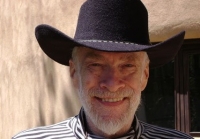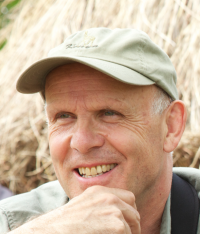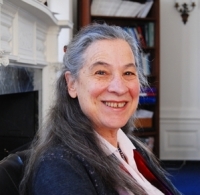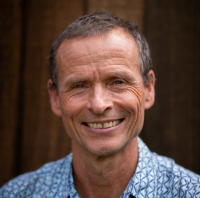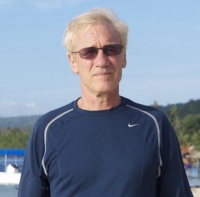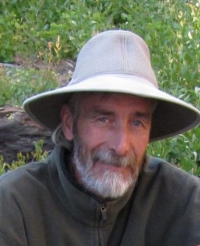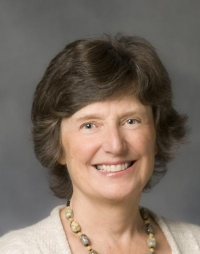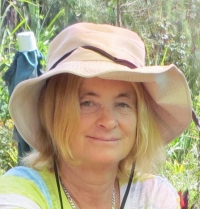Male Aggression and Violence in Human Evolution
Biographical Sketches: Co-Chairs
University of Southern California
Christopher Boehm (1931-2021) was a professor of biological sciences and anthropology at University of Southern California, and was director of the Goodall Research Center. He was a recipient of fellowships from the Simon Guggenheim Foundation and the School of Advanced Research, and was been awarded the Stirling Prize in Psychological Anthropology. Boehm did fieldwork with Navajo Indians, tribal Serbs in Montenegro, and wild chimpanzees working at Gombe National Park. His interests included political and moral evolution, and hunter-gatherer sociopolitics. He developed a large-scale database on these foragers.
Harvard University
Richard Wrangham is the Ruth Moore Professor of Biological Anthropology at Harvard University, where he has taught since 1989. His major interests are chimpanzee and human evolutionary ecology, the evolutionary dynamics of violence, and ape conservation. He received his Ph.D. in Zoology from Cambridge University in 1975, was a Research Fellow at King’s College (Cambridge) from 1977 to 1980, and taught at the Department of Anthropology at the University of Michigan (Ann Arbor) from 1981-1989. Since 1987 he has studied wild chimpanzee behavior in Kibale National Park, Uganda. His most recent book is Catching Fire: How Cooking Made Us Human (Basic Books, 2009)
Biographical Sketches: Speakers
Yale University
Carol R. Ember is president of the Human Relations Area Files at Yale University. Previously she served as executive director from 1996 to 2009. She is also the editor of the journal Cross-Cultural Research, the past-president of the Society for Anthropological Sciences, and a fellow of the American Association for the Advancement of Science. She has served as president of the Society for Cross-Cultural Research and co-directed the Summer Institutes for Comparative Anthropological Research, which were supported by the National Science Foundation. Most of Ember’s research career has been devoted to cross-cultural research on variation in marriage, family, kin groups, gender roles, predictors of war and other forms of violence. She is interested in research that integrates the fields of anthropology as well as anthropology with other disciplines. She and Melvin Ember also wrote a primer on how to do cross-cultural research, Cross-Cultural Research Methods (AltaMira Press, 2009), now in its 2nd edition.
UC San Diego
Pascal Gagneux is CARTA's Executive Co-Director, a Professor of Pathology and Anthropology, and the Department Chair of Anthropology at UC San Diego. He is interested in the evolutionary mechanisms responsible for generating and maintaining primate molecular diversity. The Gagneux laboratory studies cell-surface molecules in closely related primates species. His focus is on glycans, the oligosaccharides attached to glycolipids and glycoproteins of the surfaces of every cell and also secreted into the extra-cellular matrix. Gagneux's laboratory is exploring the roles of molecular diversity in protecting populations from pathogens as well as potential consequences for reproductive compatibility. Dr. Gagneux’s interest is in how glycan evolution is shaped by constraints from endogenous biochemistry and exogenous, pathogen-mediated natural selection, but could also have consequences for sexual selection. Dr. Gagneux has studied the behavioral ecology of wild chimpanzees in the Taï Forest, Ivory Coast, population genetics of West African chimpanzees, and differences in sialic acid biology between humans and great apes with special consideration of their differing pathogen regimes. In 2011, while Associate Director of CARTA, Dr. Gagneux helped to establish a graduate specialization in Anthropogeny at UC San Diego. This wholly unique graduate specialization is offered through eight participating graduate programs in the social and natural sciences at UC San Diego.
Arizona State University
Kim Hill is a professor at Arizona State University in the School of Human Evolution and Social Change and the Institute of Human Origins. His research has focused on foraging decisions, food sharing, parental investment, life history evolution, human biology, cooperation, and the evolutionary implications of hunter-gatherer social structure.
University of Wyoming
Robert L. Kelly is a professor and past department head of anthropology at the University of Wyoming, director of the Frison Institute, president of the Society for American Archaeology, and secretary of the Archaeology Division of the American Anthropological Association. He has authored over 100 articles, reviews, and books, including two archaeology textbooks and The Lifeways of Hunter-Gatherers (Cambridge University Press, 2013). He specializes in the ethnology and archaeology of hunter-gatherers. Since 1973, he has conducted research throughout the western U.S. and Madagascar, and he has lectured in Europe, Asia, and South America. Kelly currently researches caves and high altitude adaptations in Wyoming, as well as the archaeology of ice patches in Glacier National Park.
Utah State University
Rockefeller University
Donald Pfaff is a professor of neurobiology and behavior at The Rockefeller University, in New York. He graduated magna cum laude from Harvard College and received his Ph.D. from MIT. He is a Fellow of the American Academy of Arts and Sciences (elected 1992) and a Member of the National Academy of Sciences (elected 1994). His lab specializes in brain mechanisms underlying social behaviors, with an emphasis on molecular and electrophysiological mechanisms that underlie hormone effects on nerve cells. Pfaff is the author of several books on the brain and behavior. He received the 2005 Award for Excellence in Professional and Scholarly Publishing (medical science category) of the Association of American Publishers for his book, Brain Arousal and Information Theory (Harvard University Press, 2006). He has been the recipient of a National Institutes of Health MERIT Award.
Duke University
Arizona State University & University of Utah
Polly Wiessner is a Professor of Anthropology at Arizona State University and the University of Utah. Over the past forty years, she has conducted ongoing research among the !Kung (Ju/'hoansi) Bushmen of the Kalahari Desert on social networks, demography, economy and firelit stories. For the past thirty-four years, she has carried out ethnohistorical studies of oral traditions among the Enga of highland Papua New Guinea (PNG), tracing developments in warfare, ritual, conflict resolution and exchange over the past 400 years. She is currently studying the breakdown of traditional cultural institutions with the introduction of new technology, modern myths and how the Enga are applying restorative justice based to rebuild communities and maintain harmony through restorative justice.
